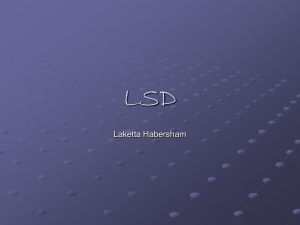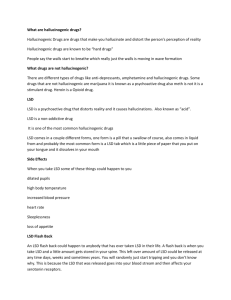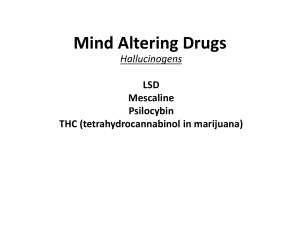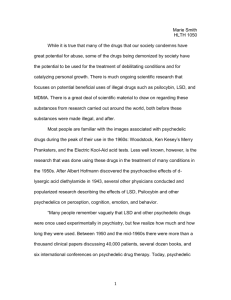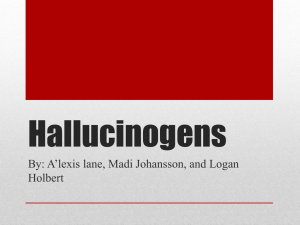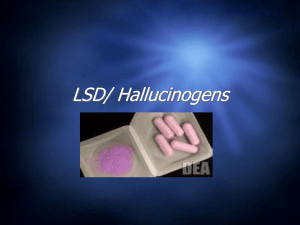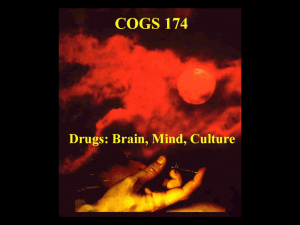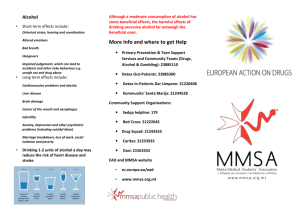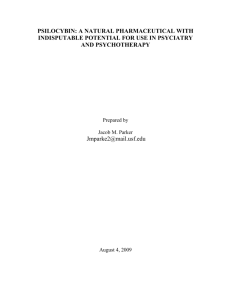Magic Mushrooms Treat Depression
advertisement
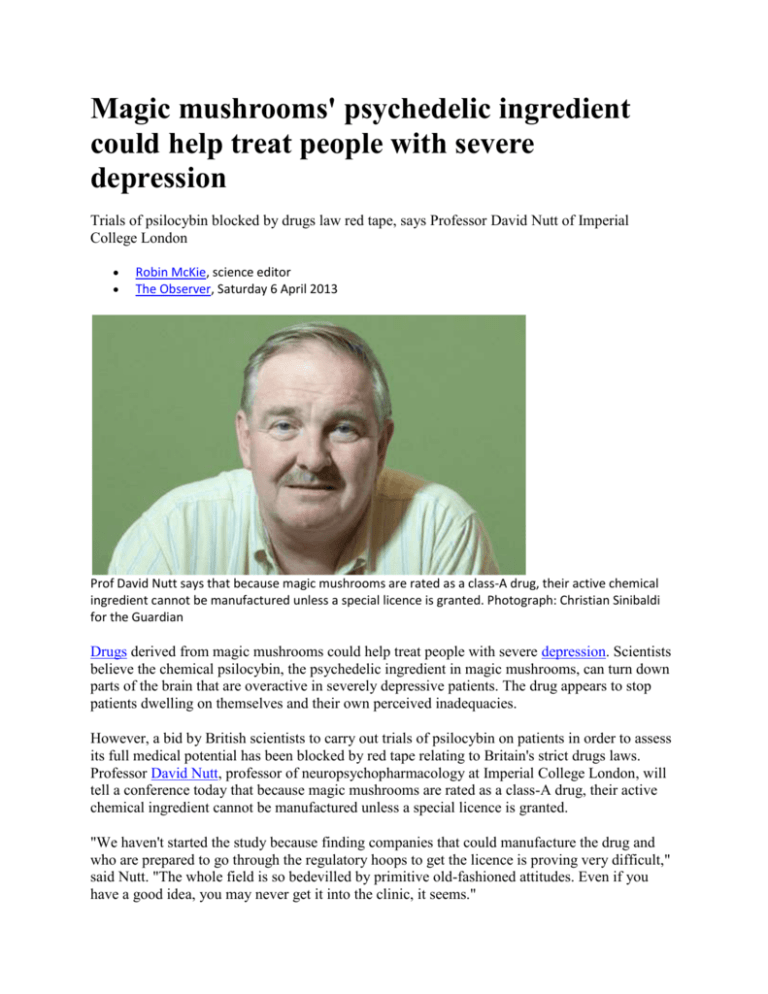
Magic mushrooms' psychedelic ingredient could help treat people with severe depression Trials of psilocybin blocked by drugs law red tape, says Professor David Nutt of Imperial College London Robin McKie, science editor The Observer, Saturday 6 April 2013 Prof David Nutt says that because magic mushrooms are rated as a class-A drug, their active chemical ingredient cannot be manufactured unless a special licence is granted. Photograph: Christian Sinibaldi for the Guardian Drugs derived from magic mushrooms could help treat people with severe depression. Scientists believe the chemical psilocybin, the psychedelic ingredient in magic mushrooms, can turn down parts of the brain that are overactive in severely depressive patients. The drug appears to stop patients dwelling on themselves and their own perceived inadequacies. However, a bid by British scientists to carry out trials of psilocybin on patients in order to assess its full medical potential has been blocked by red tape relating to Britain's strict drugs laws. Professor David Nutt, professor of neuropsychopharmacology at Imperial College London, will tell a conference today that because magic mushrooms are rated as a class-A drug, their active chemical ingredient cannot be manufactured unless a special licence is granted. "We haven't started the study because finding companies that could manufacture the drug and who are prepared to go through the regulatory hoops to get the licence is proving very difficult," said Nutt. "The whole field is so bedevilled by primitive old-fashioned attitudes. Even if you have a good idea, you may never get it into the clinic, it seems." Research by Nutt has found that psilocybin switches off part of the brain called the anterior cingulate cortex. It was known that this area is overactive in individuals suffering from depression. In his tests on healthy individuals, it was found that psilocybin had a profound effect on making these volunteers feel happier weeks after they had taken the drug, said Nutt – who was sacked as the chairman of the Advisory Council on the Misuse of Drugs in 2009 after repeatedly clashing with government ministers about the dangers and classification of illicit drugs. Nutt's team also discovered that another section of the brain known as the default mode network was also influenced by psilocybin. "People with depression have overactive default mode networks and so ruminate on themselves, on their inadequacies, on their badness, that they are worthless, that they have failed – to an extent that is sometimes delusional. Again psilo-cybin appears to block that activity and stops this obsessive rumination." To determine if psilocybin could be used as a treatment to help patients, Nutt and his team were given £550,000 by the Medical Research Council to begin a three-year project to test the drug on people with depression. Patients who had failed to respond to two previous treatments would be selected. The aim was to test 30 with the drug and 30 with a placebo. However, the group has found its path blocked by bureaucracy. So difficult has the government and the EU made it for companies to manufacture the active ingredients of Class A drugs that price tags of around £100,000 were given by chemical companies. "We only need a relatively small amount of the drug, an order worth only a few hundred pounds," said Nutt, who is set to describe his work with psilocybin at the UK Festival of Neuroscience conference in London today. "If we have to pay £100,000 we simply cannot afford to carry out the rest of the study. We have not given up but it is proving very difficult," he said. "Depression is now the largest cause of disability in Europe. There are many effective treatments but only about a third of individuals respond fully. At least 10% fail to respond to three different treatments. We badly need more types of treatment but we cannot pursue these because the government is denying scientists access to powerful tools that could help people in need. The regulations that govern researchers access to Class A drugs are totally inappropriate and harmful." Care PJ 93 I'm so glad to see this because in my last semester of psychology in college I wrote a paper on exactly this the use of time-tested psychedelic plant medicine for the use of treating depression and conditioning methods. My paper is full of references from pharmacologists, ethnobotanists, psychologists and shamans. I was given a c-minus on this paper, claiming I was only glorifying drugs(teacher was psychiatrist in training aka pill pusher). When I see more of these kind of articles and Johns Hopkins studies I feel a lot better about getting back into the field of psychology soon, and confident that study and experimentation with these elements is becoming more possible. if I can find that paper I will share it. 93/93 KH I'm sorry but treating people with severe depression with a schizophrenia inducing hallucinogenic doesn't seem very prudent to me. 93 93/93 Hi Carl, 93 Of course, your opinion is wading against the opinion of a lot of modern psychologists in the U.S. These guys (including an acquaintance of mine) are routinely lecturing at Columbia and NYU, Harvard and Yale. 93/93 pj Hi Carl & Kevin, 93 From another perspective, psychology can be considered the ‘scientization’ of spirituality. And we certainly know of the spiritual use of psychotropic plants. We also know that ingesting these plants gave the ancient Maya the ability to see the black hole at the center of our galaxy; long before Europeans ever came close to understanding what a telescope was. So there is something about activating the parts of the brain that these plants see so ready to enable that has a direct correlate with human perception of the actual, physical Universe. 93/93 pj And many lecturers from these same institutions you mentioned once lectured on the benefits of electroshock therapy and lobotomies . . . did that make them correct? What about Timothy Leary's research? Why isn't LSD the panacea drug of the ages? 93 93/93. Carl Hi Carl, 93 Tim Leary’s research led to many good things in the spiritual community; along with the work of Terrence Mckenna (sp?). And I guess from there, you may need to read some of this material first hand before criticizing what you don’t know. We’ve frequently sent videos to this list for information on this topic…you might try watching them when they come your way. For reading, I recommend you start with Neal M. Goldsmith, Ph.D.’s book: Psychedelic Healing: The Promise of Entheogens for Psychotherapy and Spiritual Development. He’s the acquaintance of mine I told you about and he runs the Poetry-Science lectures in NYC. I often send his announcements to this list. Here’s what John H. Halpern, M.D., assistant professor of psychiatry at Harvard Medical School had to say about his book: “In synchronous timing with the publication of Jung’s precious personal vision, Neal Goldsmith present his own Red Book of self-discovery and organizes it into a useful road map to the mystery within each of us—of who we are and why…” And for that matter, I and several people on this list can personally testify to the benefits of psychedelic therapy. 93/93 pj Hi Paul, 93 What I really meant to say is that I think this is an are where we should be pursued with extreme caution. My previous statement was just an assessment on your argument of authority, which is not a basis for an intellectual trump card. I have read some of Timothy Leary's work and in the right set and setting perhaps there is a potential benefit to be obtained from psychedelic therapy. Sandoz created both LSD and Psiloscybin (SP?) a very long time ago. Leary was fired from Harvard over his methods and his brain was fried by the time he was in his 60's -- not to say that he wasn't a happy guy though. I have had my own experience with both drugs, but never in a clinical environment. For me, I had one "bad trip" experience, and it has had a lasting negative impact on my life. So, from my experience, and there were indeed many good ones, the risk of permanent or intermittent psychological disturbance is very real. Had I been using the drugs in a controlled set and setting with a certified guide, then perhaps there would have been a different outcome. I was in my late teens and early twenties when I experimented with these powerful drugs and I think that they do permanently alter consciousness and do so in many beneficial ways. But there are risks, of anxiety, flashbacks from "bad trips", and it is a fact that they can bring on schizophrenic (or schizophrenic-like) episodes even weeks, months, or years after the experience. 93/93 Carl Hi Carl, 93 What I really meant to say is that I think this is an are where we should be pursued with extreme caution. My previous statement was just an assessment on your argument of authority, which is not a basis for an intellectual trump card. I’m not certain what you mean by “intellectual trump card.” But your challenge to authority was fallacious. Doctors once bled patients to cure them of disease…does that mean we should stop listening to doctors? Surely in modern psychological circles, the leading voices in these disciplines are calling out from several countries for a serious look at psychotropic substances. Accepting this has been a part of the culture of this list for some time…so that your challenge comes as a bit of a surprise in itself. Why challenge this now? Are you arriving at a new opinion on the subject? Or are you simply paying attention to it for the first time in your thinking? I have read some of Timothy Leary's work and in the right set and setting perhaps there is a potential benefit to be obtained from psychedelic therapy. Sandoz created both LSD and Psiloscybin (SP?) a very long time ago. Leary was fired from Harvard over his methods and his brain was fried by the time he was in his 60's -- not to say that he wasn't a happy guy though. And how does this shoot down what contemporary Harvard psychologists and those of other universities throughout several industrial countries have been stating as a result of research now, some 55 years later? I have had my own experience with both drugs, but never in a clinical environment. For me, I had one "bad trip" experience, and it has had a lasting negative impact on my life. So, from my experience, and there were indeed many good ones, the risk of permanent or intermittent psychological disturbance is very real. And you consider this an expert opinion?...to me it seems quite anecdotal. And your idea that a “risk of permanent or intermittent psychological disturbance” being “very real” is based on what science? Are you an expert because you dropped acid once?...or is it that you’ve been working with some of these leading psychologists? Had I been using the drugs in a controlled set and setting with a certified guide, then perhaps there would have been a different outcome. I was in my late teens and early twenties when I experimented with these powerful drugs and I think that they do permanently alter consciousness and do so in many beneficial ways. But there are risks, of anxiety, flashbacks from "bad trips", and it is a fact that they can bring on schizophrenic (or schizophrenic-like) episodes even weeks, months, or years after the experience. So, in other words, you bought the government propaganda on “flashbacks” from “bad trips”…eh? And do you also believe that LSD alters your genetic structure? And I guess you think reefer makes you a mad murderer and serial rapist…? 93/93 pj Acid Flashbacks (Includes Psilocybin) Acid flashbacks are one of the long-term effects of LSD use, and can interfere with a person’s daily life even months or years after they use LSD. Scientists still know little about what causes them or how to treat them. Keep reading for more on acid flashbacks. An acid flashback occurs when a person who has used LSD in the past experiences theeffects of acid use, such as hallucinations, without taking the drug again. They can occur days or even years after the person used LSD. Acid flashbacks may occur only once, or they may be persistent and interfere with a person's ability to function in daily tasks. A person experiencing an acid flashback may see colors or spots that aren’t there or may see things in a distorted way, such as with halos or trails of light. Acid flashbacks more rarely cause people to hear things that aren't real. The person experiencing acid flashbacks may not be able to tell what is real and what is not, and they may feel like they are high on LSD again. Like the effects of LSD, acid flashbacks vary from person to person and are very unpredictable and often frightening. When acid flashbacks continue and interfere with daily life this is known as hallucinogen-induced persistent perception disorder (HPPD). The most common type of HPPD occurs when a person’s normal vision is often disrupted by flashbacks, such as seeing spots or trails of light frequently, though it can be more serious and interfere with a person’s perception of reality. Scientists aren't sure what causes acid flashbacks or HPPD, but there are several theories: The brain may be damaged by LSD use, causing it to misfire and send incorrect signals The way the brain functions and perceives information may be changed by LSD use, such as being much more sensitive to light and therefore seeing halos or trails The drug or some portion of it may be stored in the body or brain and released again later Not everyone who uses LSD has acid flashbacks, but because LSD has very unpredictable effects it's hard to know if a person will have flashbacks and when the acid flashbacks will occur. Some factors that seem to increase the chances of a person having flashbacks include: Heavy or frequent LSD use Bad LSD trips Marijuana use Drinking alcohol Fatigue Stress Existing mental illnesses or personality disorders Use of certain prescription drugs, like anti-depressants Being susceptible to suggestion These risk factors do not give a clear indication of who will experience an acid flashback, however, since even a healthy person who only uses LSD once may experience acid flashbacks. There is no cure for acid flashbacks. Some medications, such as anti-seizure drugs, have been used in flashback or HPPD treatment, but perhaps because of the unpredictability of acid flashbacks doctors have not yet found a definite cure for all acid flashback sufferers. Sources: National Institute on Drug Abuse, "Hallucinogens: LSD, Peyote, Psilocybin, PCP" [online] SAMHSA Health Information Network, "Lysergic Acid Diethylamide (LSD)" [online] PubMed Central, Canada Medical Association Journal, "Use of anti-epileptic medication in treating 'flashbacks' from hallucinogenic drugs" [online] ERIC, "LSD Flashbacks: An Overview of the Literature for Counselors" [online] PubMed.gov, "Drug Flashbacks. II. Some additional findings." [online] International Bibliographic Information on Dietary Supplements, Record detail, "LSD flashback syndrome exacerbated by selective serotonin reuptake inhibitor antidepressants in adolescents" [online] 93 93/93 Carl Abstract of another article. Psilocybin induces schizophrenia-like psychosis in humans via a serotonin-2 agonist action. Vollenweider FX, Vollenweider-Scherpenhuyzen MF, Bäbler A, Vogel H, Hell D. Source Research Department, Psychiatric University Hospital Zürich, Switzerland. Abstract Psilocybin, an indoleamine hallucinogen, produces a psychosis-like syndrome in humans that resembles first episodes of schizophrenia. In healthy human volunteers, the psychotomimetic effects of psilocybin were blocked dose-dependently by the serotonin-2A antagonist ketanserin or the atypical antipsychotic risperidone, but were increased by the dopamine antagonist and typical antipsychotic haloperidol. These data are consistent with animal studies and provide the first evidence in humans that psilocybin-induced psychosis is due to serotonin-2A receptor activation, independently of dopamine stimulation. Thus, serotonin-2A overactivity may be involved in the pathophysiology of schizophrenia and serotonin-2A antagonism may contribute to therapeutic effects of antipsychotics. PMID: 9875725 [PubMed - indexed for MEDLINE] The following toggler user interface control may not be accessible. Tab to the next button to revert the control to an accessible version. Destroy user interface controlPublication Types, MeSH Terms, Substances The following toggler user interface control may not be accessible. Tab to the next button to revert the control to an accessible version. Destroy user interface controlLinkOut - more resources 93 Carl You use government propaganda agencies to validate this? They also tell you that if you’re using drugs while having sex w/someone w/AIDS, you’re more likely to get AIDS yourself. …sheesh! 93 Yes…and the “schizophrenic psychosis” is the very symptom one is striving for when using the drug…your point? 93 pj 93 My opinion on the subject is this, that psychedelic substances, it seems to be generally agreed, alter the brain (either chemically or structurally). I don't feel that simply giving "magic mushrooms" to a depressive will cure anything. I know a few schizophrenic people who would definitely NOT benefit from more LSD. Perhaps, however, under some supervision and intensive therapy the drugs could be effective. In conjunction with psychological and behavioral therapy, the drugs could be the key missing in these all but failing methods to "fix" these disorders. I believe, and this is again, just my opinion, that those who have dropped acid and subsequently were diagnosed with schizophrenia already had a predisposition to schizophrenia before taking any so-called mind altering drugs. Psychedelics open up the mind, seems an alchemical process really, and depending on the predisposition and the will of the operator, the effects will be varied. Someone with a tendency to mental illness would probably only worsen their mental state with psychedelics, unless the intent was self-healing, and they simultaneously pursued complementary ways and means. It seems to me quite similar to ritual magick and mysticism and the opening up of the mind and formulating the body of light. Anyone pursuing a path of initiation should have their head examined and we mean that quite literally (to paraphrase someone we all know and love). 93/93 PDT Hi Paul, 93 My opinion on the subject is this, that psychedelic substances, it seems to be generally agreed, alter the brain (either chemically or structurally). I don't feel that simply giving "magic mushrooms" to a depressive will cure anything. Everything alters the brain…if one is a vegetarian and another, a carnivore. A wine drinker is different from a scotch drinker. All our senses act in constant ‘eucharist’ with all they perceive. People that spend most of their day in walls painted blue are different from those that spend their day in walls painted grey. People that smell the local Burger King all day are different from people that smell the perfume of the local department store. There’s visual and aroma therapies, and there’s science to show that certain areas of the brain that are used in depression-maintaining thought processes that early studies are showing can be positively interrupted with the use of psychotropic substances. I know a few schizophrenic people who would definitely NOT benefit from more LSD. The purpose of the study was not to work with schizophrenia…but with depression. Remember, a properly conducted magickal ceremony is a non-drug approach to the same ‘schizophrenia’ that LSD produces. With the magickal ceremony, this occurs in a more controlled manner that meets with a certain (shall we say) intellectual sophistication; though such sophistication is not necessarily necessary in that we see aboriginal cultures have managed great feats without being very left-brained at all. Perhaps, however, under some supervision and intensive therapy the drugs could be effective. In conjunction with psychological and behavioral therapy, the drugs could be the key missing in these all but failing methods to "fix" these disorders. I believe, and this is again, just my opinion, that those who have dropped acid and subsequently were diagnosed with schizophrenia already had a predisposition to schizophrenia before taking any so-called mind altering drugs. Psychedelics open up the mind, seems an alchemical process really, and depending on the predisposition and the will of the operator, the effects will be varied. Someone with a tendency to mental illness would probably only worsen their mental state with psychedelics, unless the intent was self-healing, and they simultaneously pursued complementary ways and means. It seems to me quite similar to ritual magick and mysticism and the opening up of the mind and formulating the body of light. Anyone pursuing a path of initiation should have their head examined and we mean that quite literally (to paraphrase someone we all know and love). As I’ve maintained for a long time, people come to the study of Magick in general, due to some form of psychic disturbance. Such disturbance is often termed a disease in standard psychological models. But sometimes, such ‘spiritual’ unrest is more a motivating evocation on the part of an individual to pursue avenues of investigation, not unlike the avenues of the other sciences and entrepreneurial pursuits. 93/93 pj Hi Paul, 93 What I really meant to say is that I think this is an are where we should be pursued with extreme caution. My previous statement was just an assessment on your argument of authority, which is not a basis for an intellectual trump card. I’m not certain what you mean by “intellectual trump card.” But your challenge to authority was fallacious. Doctors once bled patients to cure them of disease…does that mean we should stop listening to doctors? Surely in modern psychological circles, the leading voices in these disciplines are calling out from several countries for a serious look at psychotropic substances. Accepting this has been a part of the culture of this list for some time…so that your challenge comes as a bit of a surprise in itself. Why challenge this now? Are you arriving at a new opinion on the subject? Or are you simply paying attention to it for the first time in your thinking? If there is a consensus among the leading psychologists in the field, than the appeal to authority is valid and I am incorrect. I have read some of Timothy Leary's work and in the right set and setting perhaps there is a potential benefit to be obtained from psychedelic therapy. Sandoz created both LSD and Psiloscybin (SP?) a very long time ago. Leary was fired from Harvard over his methods and his brain was fried by the time he was in his 60's -- not to say that he wasn't a happy guy though. And how does this shoot down what contemporary Harvard psychologists and those of other universities throughout several industrial countries have been stating as a result of research now, some 55 years later? It doesn't, however, you stated previously that I had no idea of his work in the field. In fact, I have read his work , "The Psychedelic Experience" on more than one occasion. I'm not saying this makes me an expert, but your claim that I know nothing of his work is incorrect. The fact that his brain was fried later in life would seem to indicate a need for long-term studies over decades. I have had my own experience with both drugs, but never in a clinical environment. For me, I had one "bad trip" experience, and it has had a lasting negative impact on my life. So, from my experience, and there were indeed many good ones, the risk of permanent or intermittent psychological disturbance is very real. And you consider this an expert opinion?...to me it seems quite anecdotal. And your idea that a “risk of permanent or intermittent psychological disturbance” being “very real” is based on what science? Are you an expert because you dropped acid once?...or is it that you’ve been working with some of these leading psychologists? I am sharing my experience. I have experienced it on many more than one occasion as you would understand if you read where i said I experimented with the drug in my late teens through early twenties. How many trips I took, I can't say, but easily more than a dozen. Does this make me an expert? No. Is it alright for me to share my experience? Yes. Had i had an appropriate guide on my bad experience, perhaps it would have been more positive. But i make no claim to be any type of expert. Had I been using the drugs in a controlled set and setting with a certified guide, then perhaps there would have been a different outcome. I was in my late teens and early twenties when I experimented with these powerful drugs and I think that they do permanently alter consciousness and do so in many beneficial ways. But there are risks, of anxiety, flashbacks from "bad trips", and it is a fact that they can bring on schizophrenic (or schizophrenic-like) episodes even weeks, months, or years after the experience. So, in other words, you bought the government propaganda on “flashbacks” from “bad trips”…eh? And do you also believe that LSD alters your genetic structure? And I guess you think reefer makes you a mad murderer and serial rapist…? No, I haven't bought the propaganda. I have experienced it first hand. I have also talked to others, some of whom you know and have shared in many trips with me, who agree with my opinions on the subject. As I said before, this is sharing experience. I make no claims as an expert. Your last sentence is hyperbolic. Of course the answer to that is no, I do not think that. Flashbacks, anxiety and schizophrenic episodes are not government propaganda, but documented phenomena. You even go on to ask rhetorically in another email something to the effect of "isn't schizophreniclike symptoms what we are striving for?" Don't I have a right to share my experience without being castigated? 93/93 Carl Hi Paul, PDT and all other contributors, 93 I have changed my opinion through this discussion. These are very powerful drugs and do deserve to be researched. I still think that there are many caveats that need to be heeded in their use. But thank you all for your contributions on the subject. I hope my experiential contributions were worthy of the time expended in your reading and my writing them. 93/93 Carl
